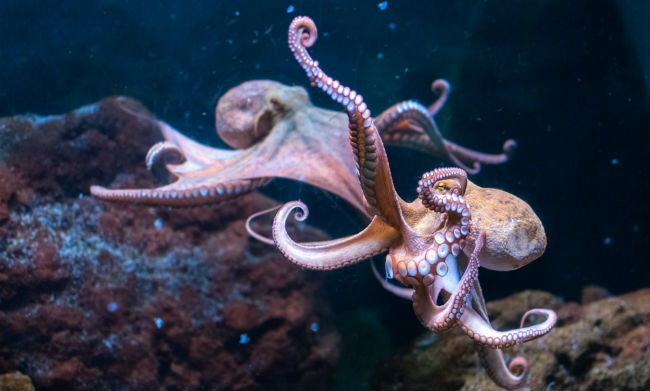
If you don’t already have a healthy fear of octopuses, let us illumine you: they’re masters of escape, they’re incredibly smart, and they’re taking over the ocean as we speak.
This last fact comes courtesy of a new analysis of cephalopod boom-bust cycles, published in Current Biology. Apparently cephalopods—squid, octopuses, and cuttlefish—are in a pretty strong boom cycle right now.
“The consistency was the biggest surprise,” lead study author Zoë Doubleday of the University of Adelaide told Gizmodo. “Cephalopods are notoriously variable, and population abundance can fluctuate wildly, both within and among species.”
In fact, the study was prompted by an Australian cuttlefish bust cycle a few years back. “They almost disappeared completely,” Doubleday said. The downturn gave one of her co-authors the idea of examining boom-bust cycles across other cephalopod populations to see if any patterns emerged. “We didn’t know how much data would be out there, but we managed to get quite a bit together,” Doubleday said.
The conclusion: after looking at data on 35 different species of cephalopods from between 1953 and 2013, the team discovered that, while there were substantial differences in population from year to year, and while a few of those species declined, the large majority of the cephalopods they were looking at actually increased in number.
Non-scientific lingo: the octopi are taking over the ocean, people! Flee to the skies!
The reason for the boom, Doubleday says, is because cephalopods are essentially the weeds of the sea. “If environmental conditions are good, they can rapidly exploit those conditions because they grow so fast.”
And, of course, we have only ourselves to blame for those good environmental weed-growin’ conditions — though Doubleday is careful not to point fingers. “I don’t think it’s any one single factor,” she said. “But something’s changing on quite a large scale that’s giving cephalopods an edge.” Something meaning, possibly, global warming, or the fact that we’re essentially emptying the seas of predatory fish, the main competition of cephalopods.
The only good news in all of this is that cephalopods are ruthless beings — if the increased population runs out of food, the imminent disaster that is octopuses taking over the world might actually be solved. Says Doubleday, “They’re highly cannibalistic — they might start eating each other if they overgrow.”
And there you have it. A horror film, from start to finish, presented in neat package format. Take it as you will, and mail us the royalty checks when you’re finished. And for all you non-screenplay writers out there, it might be time to cultivate a taste for squid.






